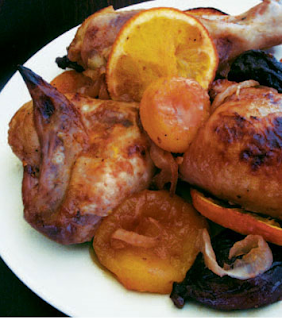baked cut-up chicken with fruit
Makes 4 to 5 servings
I recommend this recipe for absolute beginners. Very
little cutting or fussing is required, and the fruit, onion, garlic, and chicken
juices come together on their own to create a sweet, succulent dish. It takes
some time to bake, so plan accordingly. But there’s no work involved during that
time, except occasionally basting the chicken. Try to get an organic orange for
this—a particularly good idea when a recipe includes the peel. A blood orange,
which is dark sangria-red on the inside, looks especially lovely. The various
dried fruits are negotiable. If you can’t find (or don’t love) any of them, you
can swap in more of the ones you prefer. That said, I have to tell you that the
combination as written is delicious, and worth trying once. You’ll be surprised
at how everything gets transformed as it all bakes together. And if you adore
fruit and want to add more, don’t hold back. You can really pack it into the
pan!
One 3-to 4-pound cut-up chicken
½ teaspoon salt
¼ teaspoon freshly ground black pepper
1 teaspoon mild paprika
1 medium red or yellow onion
8 to 10 good-sized cloves garlic, peeled (left whole)
Approximately 20 of each:
- -Dried apricots
- -Pitted dried plums (prunes)
- -Dried figs (stems trimmed off and discarded)
1 blood orange or navel orange
1. Adjust the oven rack to the
center position and preheat the oven to 375°F.
2. Rinse the chicken pieces under
cold running water, then pat dry with paper towels. If there is any extraneous
fat here or there, you can trim it off with scissors and throw it away. Arrange
the chicken pieces, skin side up, in a 9-by 13-inch baking pan.
3. Combine the salt, pepper, and
paprika in a small bowl, and then sprinkle this mixture over the chicken. Use
your fingers to rub it into the skin on as much surface area as possible.
4. Cut the ends off the onion,
peel it, and cut it in half lengthwise (from root end to stem end). Lay each
half, cut side down, on a cutting board, and cut it lengthwise into ¼-inch-thick
slices. Scatter the onion and the garlic cloves over the chicken, and then
scatter the dried fruit over the chicken, packing it into the spaces between the
pieces and letting some of it land on top.
5. Leaving the peel on, cut the
orange in half lengthwise (from top to bottom). Lay each half on the cutting
board and cut it crosswise into ¼-inch-thick half-moons. Scatter the orange
slices over the chicken, and cover the pan tightly with aluminum foil. Bake,
undisturbed, for 1 hour.
6. Remove the pan from the oven,
and very carefully lift the foil (the accumulated steam can be hot enough to
burn you). Flip the chicken pieces over, using tongs or a fork. Using a mitt or
a pot holder, tilt the pan slightly with one hand, and using a baster or a large
spoon, baste the juices over both chicken and fruit with the other hand. This
distributes and mingles the flavors as well as the moisture, yielding delicious
results. If any of the fruit looks dry at this point, or at subsequent bastings,
just push it down into the juices.
7. Cover the pan tightly with the
foil again, and return it to the oven for another 20 minutes of undisturbed
baking.
8. Repeat the basting procedure,
and then flip the chicken pieces back to skin-side-up position. Return the pan
to the oven (without covering it this time) and bake for another 10 to 15
minutes, or until the chicken is golden on top.
9. Remove the pan from the oven,
baste the chicken and fruit a few more times, and then tent it loosely with
foil. Let it rest for about 10 minutes.
10. Serve hot or warm, being sure
to include a generous portion of fruit with each serving.
A CUT-UP CHICKEN
Buying chicken already cut into individual pieces saves
time and makes cooking easier. Look for cut-up chickens in the poultry case of
the supermarket, or better yet, go to a butcher shop or a market with working
butchers, where you can buy a whole chicken and get it cut up to order. If you
go this route, ask the butcher to cut each breast half into two pieces, which
makes for easier serving and eating.
HOW ABOUT THOSE GIBLETS?
Whole chickens are often sold with the giblets (the liver,
heart, and gizzards) and neck stuffed inside the bird in a little plastic bag.
You can cook the liver in a hot skillet with a little olive oil, sprinkle it
with salt and pepper, and enjoy it as a snack. As for the rest, you can make a
simple broth by simmering them in a small pot in water to cover. This broth can
then be combined with the pan juices after cooking to make a light sauce. Or
simply toss the giblets and neck in the roasting pan and let them cook along
with the chicken so they add some flavor to the pan juices. Then discard them
when you collect and skim the juices.
GET
CREATIVE
- For a more exotic Middle Eastern flavor, you can add either a tablespoon of za’atar spice mix (see Chapter 5: Burgers), or 2 teaspoons ground cumin plus ½ teaspoon cinnamon.
- Serve with additional fresh orange slices, plus a few lemon wedges so you can squeeze fresh lemon juice on each portion.
- If you like things spicy, serve with a bit of harissa, a delicious Middle Eastern chili sauce sold in jars in Middle Eastern groceries and in the ethnic foods section of some supermarkets.
- This dish goes well with couscous (see Chapter 7: Sides) and Absolutely the Best Broccoli (Chapter 7: Sides). You can cook them both while the chicken is in the oven.







Aucun commentaire